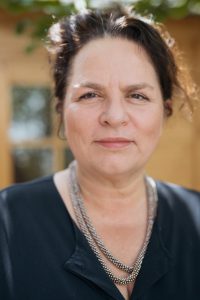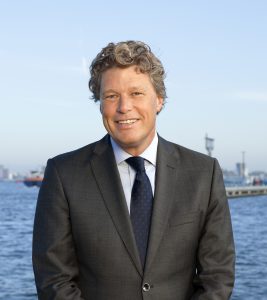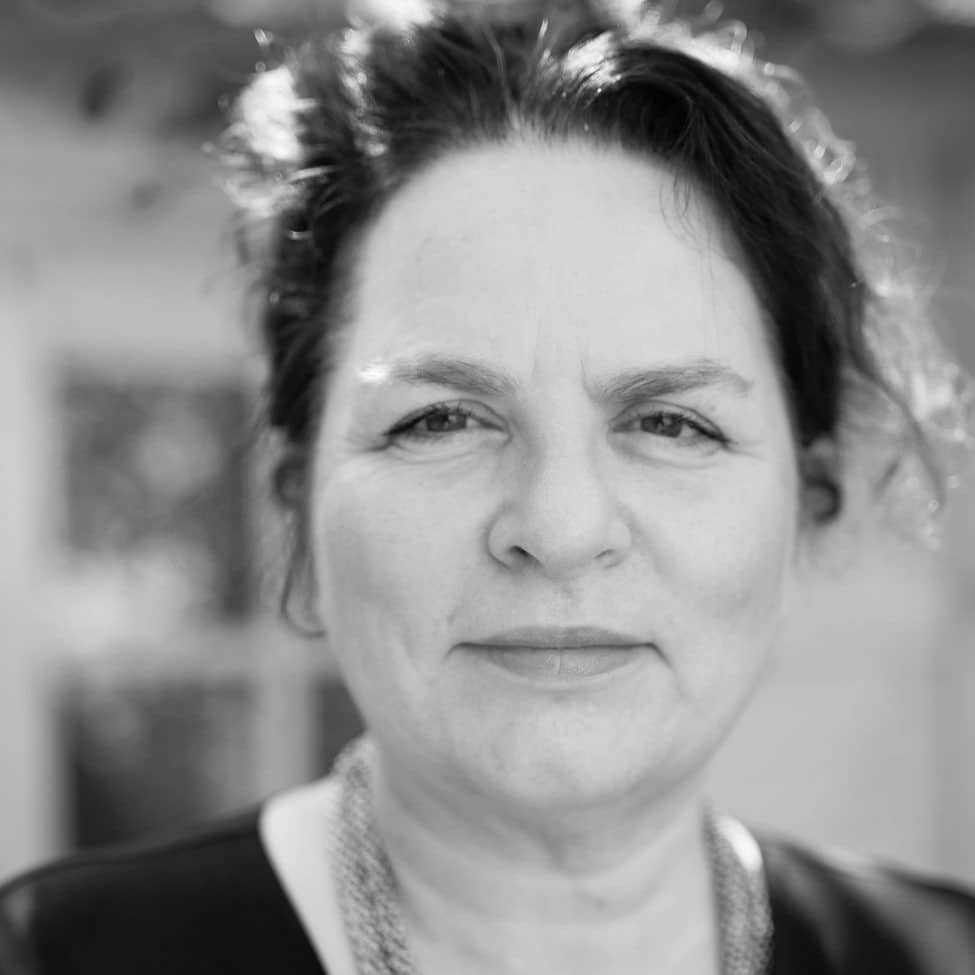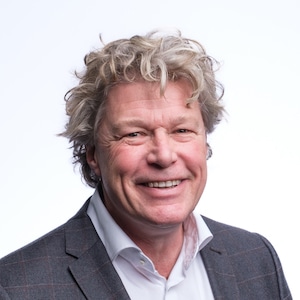Board Talk: ‘Voor wat voor regio zijn we aan het optimaliseren?’
Om de energietransitie voor elkaar te krijgen moeten we slim met data omgaan. En dat kan ook op een transparante en democratische manier, vinden Marleen Stikker en Koen Overtoom. ‘Ik denk dat het systeem sowieso gaat kantelen, maar vind het nog wel spannend op welke manier we dat voor elkaar krijgen.’
Het is stil op straat. Dramatisch stil zelfs, zegt Marleen Stikker die de nieuwe rust vanuit haar huis in de Jordaan dagelijks ervaart. “Dat de toeristen wegblijven is in de eerste plaats een gigantische klap voor ondernemers, maar het hoort ook niet bij de dynamiek van een grote stad”, zegt de directeur van Waag, de Amsterdamse denktank die zich vanuit een wetenschappelijk en technologisch perspectief bezighoudt met actief burgerschap en sociale innovatie. “Er mag dus wat drukte terug, maar wel in balans. We moeten de economie aan de praat krijgen, de ondernemers weer lucht geven en tegelijkertijd weer grip krijgen op de publieke ruimte in het hart van de stad.”
Koen Overtoom merkt als directeur van het Havenbedrijf Amsterdam op een andere manier dat de toeristen wegblijven: in zijn haven meren geen cruiseschepen meer aan. “Wij hebben door deze crisis een omzetverlies van zo’n 5 procent en dat komt vooral daardoor. Goederen blijven wel doorstromen in deze crisis. Ik ben het wel met Marleen eens dat we goed moeten kijken naar hierna, hoe we de terugkeer van toeristen in goede banen gaan leiden. Tegelijkertijd denk ik niet dat alles automatisch weer terugveert als dit voorbij is. Ik denk dat het voor veel ondernemers overleven wordt en dat die blij zijn met elke toerist. De vraag is of we wel wat te kiezen hebben.”
Welke rol is er nu en na deze crisis voor de Board weggelegd?
Overtoom: “Ik denk dat de Board partijen bij elkaar kan brengen die werken aan initiatieven waar weer economische activiteit uit voortkomt. De Board en de regio zijn bijvoorbeeld al bezig met het Nationaal Groeifonds, bijvoorbeeld met initiatieven rondom waterstof — waar wij in de haven ook mee bezig zijn — en de metrolijn van Hoofddorp naar Schiphol.”
Stikker: “We moeten ons als Board afvragen voor wat voor stad, voor wat voor regio we aan het optimaliseren zijn. Ik denk daarom wel dat de vertegenwoordiging van de maatschappelijke kant nog iets evenwichtiger kan, dat niet alleen ondernemers en kennisinstellingen vertegenwoordigd zijn, maar bijvoorbeeld ook de zorg, vakbonden en politie. Die integraliteit zou het uitgangspunt moeten zijn.”
Overtoom: “Die integraliteit is inderdaad belangrijk. Dat zie ik ook in ons gebied. Wij moeten ruimtelijke keuzes maken tussen wonen, werken en recreëren en zijn daarbij continu op zoek naar de optimale oplossing. Neem de helihaven die wij hebben voor de traumahelikopter. Rondom dat gebied kunnen geen windmolens staan, wat vanuit duurzaamheidsperspectief natuurlijk niet fijn is, maar voor goede zorg essentieel. Zo zoeken we continu naar de balans. Ook op regionaal niveau hangt alles met elkaar samen. We moeten dat hele spectrum overzien en daarin kan de Board een belangrijke rol spelen.”

Marleen Stikker
Jullie beider organisaties houden je op verschillende manieren bezig met de energietransitie in de regio. Zo is de Waag onderdeel van Internet of Energy, een wereldwijde beweging die werkt aan een nieuw model voor de energiesector. Wat is dat model precies?
Stikker: “In het huidige energiesysteem hebben een paar partijen het voor het zeggen. Het is een ondoorzichtig monolitisch systeem en met Internet of Energy werken we aan een veelvormig systeem waarbij aanbieders en afnemers zich vrijelijk kunnen aansluiten en volgens een bepaald protocol energie kunnen afnemen en aanbieden aan het netwerk. Het werkt dus eigenlijk net als het oorspronkelijke internet. Er is een robuuste infrastructuur en er zijn allerlei fijnmazige mogelijkheden om aan te sluiten. Internet of Energy past veel beter bij alle nieuwe manieren van energieopwekking en energieopslag die er nu zijn. Dat heeft alleen maar nut als het een beetje gestructureerd gebeurt en dat is waar dat model aan moet bijdragen. Heel concreet zijn we in een wijk in Amsterdam bezig met een onderzoek naar energiepositieve wijken en de rol die burgers daarin kunnen hebben, hier zijn we onderzoekspartner van de gemeente Amsterdam die weer onderdeel uitmaakt van het Europese Atelier-programma. In dit project zien we dat mensen hier graag mee aan de slag gaan en dat er in het maatschappelijk domein heel veel kennis is. De betrokkenheid is groot, de bereidheid om samen te werken met de gemeente is groot. Maar het moet wel echt zijn: het moet geen schijnparticipatie zijn. Daarvoor zijn mensen inmiddels te betrokken bij dit vraagstuk. En echt niet alleen de klimaatenthousiastelingen.”
Overtoom: “Wij passen in de haven eigenlijk ook een vorm van Internet of Energy toe: in de haven zijn wij het Shared Energy Platform begonnen, een apart bedrijfje waarin we de bronnen en de afnemer rechtstreeks aan elkaar verbinden en het bestaande energienetwerk gebruiken om de energie te verdelen. We zijn gestart met een koppeling tussen de zonnepanelen en windmolens in de haven aan de walstroom voor riviercruises. En alleen al daarmee konden we de energieprijs 30 procent naar beneden drukken. We bieden nu bedrijven in de haven de mogelijkheid om hun data te delen en daardoor dus veel slimmer gebruik te maken van het energienet. De bronnendiversificatie voor het warmtenet willen we straks ook vanuit de haven faciliteren, zodat we goede alternatieven hebben als straks het Afvalenergiebedrijf minder gaat verbranden door de circulaire economie. Dan kunnen we bijvoorbeeld de warmte van een datacenter, of de warmte van bepaalde productieprocessen in de haven gaan gebruiken. Hoe meer data we uiteindelijk gaan verknopen, hoe beter we dat voor elkaar kunnen krijgen.”

Koen Overtoom
Data op een goede manier delen en met elkaar verbinden blijkt dus een belangrijke voorwaarde voor de energietransitie. De Board werkt met AMdEX bijvoorbeeld aan een betrouwbare datamarkt. Wat zijn jullie gedachten over verantwoord datadelen?
Overtoom: “We zitten nu in een spannende fase omdat die energiebedrijven nog vrij veel power hebben en die willen die macht nog onvoldoende loslaten. Terwijl de initiatieven die Marleen beschrijft en waar wij mee bezig zijn van een heel ander systeem uitgaan. Ik denk dat het systeem sowieso gaat kantelen — want er is een meerderheid die dat wil — maar ik vind het nog wel spannend op welke manier we dat voor elkaar krijgen.”
Stikker: “De huidige verdienmodellen van de energiemarkt komen inderdaad niet overeen met wat de energiemarkt nu aan het worden is. Je kunt je zelfs afvragen of energie wel een markt zou moeten zijn. Energie is een basisbehoefte en daarom zie ik het als een commons, een gemeengoed, waaromheen een markt kan ontstaan. We moeten energie opwekken en daarin maken we allerlei keuzes waarin verdienmodellen denkbaar zijn. Maar dat is iets anders dan ervan uitgaan dat energie een markt is die we vervolgens moeten gaan reguleren. Kijk naar internet. Zoals ik in mijn boek Het internet is stuk ook schrijf, zijn we internet als een soort markt gaan zien en is de publieke waarde verdwenen. Nu proberen we de escalaties van die markt waarin een paar partijen de macht hebben met heel veel kracht terug te duwen. Ik hoop dat we daarvan hebben geleerd en er nu met Internet of Energy voor gaan zorgen dat niet een paar partijen de data in handen krijgen, en vervolgens met algoritmes in hun black box kunnen gaan opereren. We moeten zoeken naar een structuur van maximale transparantie, waarbinnen wel gewoon geld verdiend kan worden.”
Overtoom: “Er wordt nu inderdaad onbeschoft veel geld verdiend met data. Dat is niet wat wij willen in de haven: wij willen die data gebruiken om te optimaliseren. Wij kunnen laten zien dat klanten ervan profiteren als ze hun data delen, dat ze eigenaar blijven van hun data en dan zie je dat ze ook bereid zijn om die data te delen.”
Stikker: “Het idee dat je je privacy op zou moeten geven om te kunnen profiteren van data en algoritmes is een valse propositie geweest. Daar moeten we echt vanaf.”
Board Talk
Het interview met Marleen Stikker en Koen Overtoom is deel 9 uit de reeks Board Talk. Hierin praten we met Boardleden over de grootste uitdagingen voor de Amsterdamse metropool. Een regio die een duurzame, gezonde leefomgeving biedt, verantwoorde digitalisering en waardevol werk voor iedereen. Dit zijn ook de belangrijkste thema’s voor Amsterdam Economic Board. Lees ook de andere interviews in de serie Board Talk.
16 februari 2021
Meer weten over
Neem contact op
Blijf jij ook op de hoogte?
8x per jaar nieuws en events uit de regio: schrijf je in voor de Board Update nieuwsbrief
Deel dit artikel
Wil je op de hoogte blijven?
Volg ons dagelijks op LinkedIn en schrijf je in voor de Board Update nieuwsbrief.
Lees ook deze berichten
- Een nieuwe lichting gedreven jongeren is aangetreden bij Young on Board, de ...
- Met de selectie van vier kanshebbers is de regionale voorronde van de ...
- Met meer dan 80 ondernemers, 40 investeerders en diverse dienstverleners bood LSH Capital Match ...


